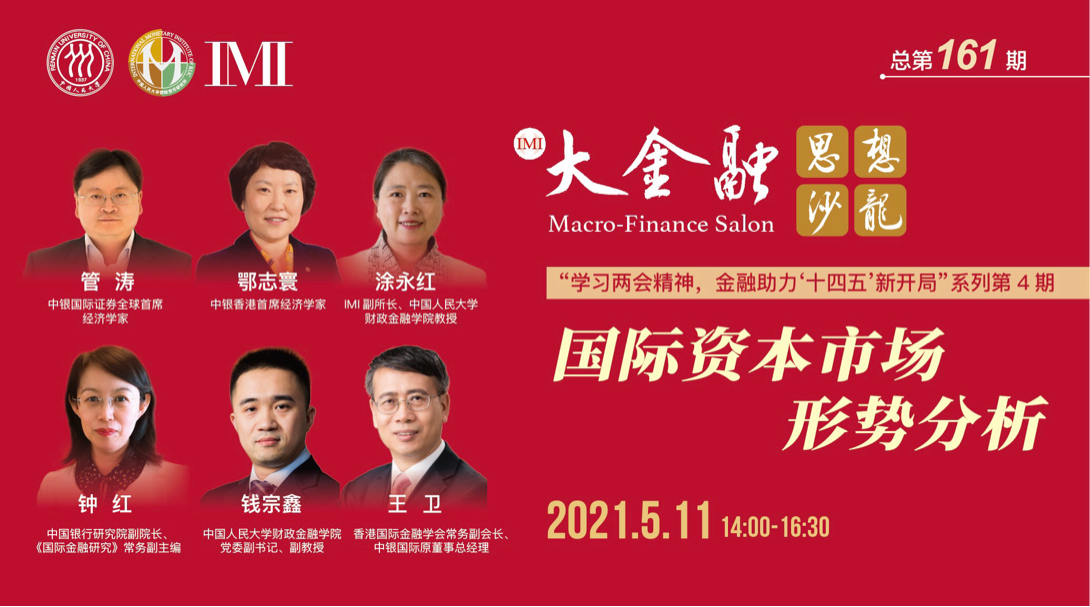Macro-Finance Salon (No. 161): Analysis of the International Capital Market Situation
2021-05-11 IMI 
On May 11, Macro-finance Salon (No. 161), the 4th session of the series entitled “Finance Propels the Opening of the Fourteenth Five-Year Plan: Implementing the Principles of the Two Sessions”, was successfully held through video conferencing. It was co-hosted by the International Monetary Institute (IMI), Renmin University of China, the Monetary and Finance Department of the School of Finance, Renmin University of China, and China Financial Policy Research Center. Qian Zongxin, Deputy Secretary of CPC, Associate Professor, School of Finance, RUC delivered a report named "Analysis of the International Capital Market Situation”. The conference was presided over by Tu Yonghong, Deputy Director of IMI, and Professor, School of Finance, RUC, and participating members included E Zhihuan, Chief Economist, Bank of China (Hong Kong), Guan Tao, global chief economist of BOC Securities, Wang Wei, Managing Director of Bank of China International, and Executive Vice President of Hong Kong Institute for International Finance, and Zhong Hong, Associate Dean, Academy of Bank of China and Executive Deputy Editor-in-Chief, Studies of International Finance.
First of all, Professor Qian Zongxin delivered a keynote report entitled "Analysis of the International Capital Market Situation”. The main focus of the report is the US macroeconomic situation, the US capital market situation, the European macroeconomic situation and the European capital market situation.
The core message of the report is as follows:
First, the overall macro-economic situation of US exceeded expectations, which is mainly reflected in the fact that the actual GDP growth is better than expected. At the same time, professional economists in the US have better expectations of macro economy than before, and their outlook on the economic situation has improved. Besides, inflation expectations have increased, but the risks of inflation are not high, and the momentum of economic recovery has enhanced. However, the employment rate is still not optimistic, and the US monetary policy environment will continue to be loose in the short term.
Second, stocks, real estate and treasury bond occupy the US capital market. In terms of growth rate, the stock market, high-interest corporate bonds, and the real estate market have seen the most dramatic growth in scale. Long-term Treasury bond yields have risen, but are still not high, and the liquidity of treasury bond market is recovering; corporate bond market risk appetite is strengthening; in the stock market, the current valuation of the S&P 500 is relatively high, but the risk appetite of the US stock market is still close to the median level in history; the valuations of the US real estate market are increasing, the prices of the real estate market have increased dramatically in the past year, and the leverage rate is falling.
Third, concerning the overall situation in Europe, economic growth is lower than expected, so the expectations of recovery growth are delayed, and inflation expectations rose sharply, but the risk of inflation is relatively small. However, macroeconomic performance has great heterogeneity in the Eurozone and the EU, which is mainly reflected in the unemployment rate, macro leverage ratio, and sovereign risk.
Fourth, European stock market is recovering. Volatility continues to decline, valuation risk is not obvious, and real estate market is overvalued. Globally, Japan has the highest systemic risk. Since the pandemic, the global total systemic risk has been declining, and the geopolitical risk is at a low level.
During the seminar, the guests conducted discussions on the situation of the international capital market, the impact of capital flows in emerging markets, cross-border capital management, and the risks and responses faced by emerging economies in the context of "shrinking panic".
